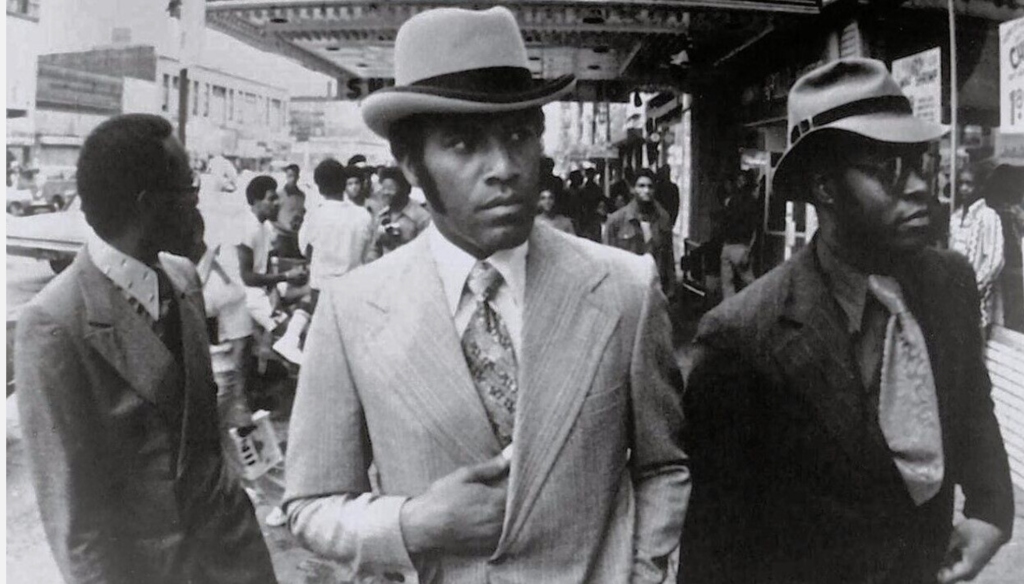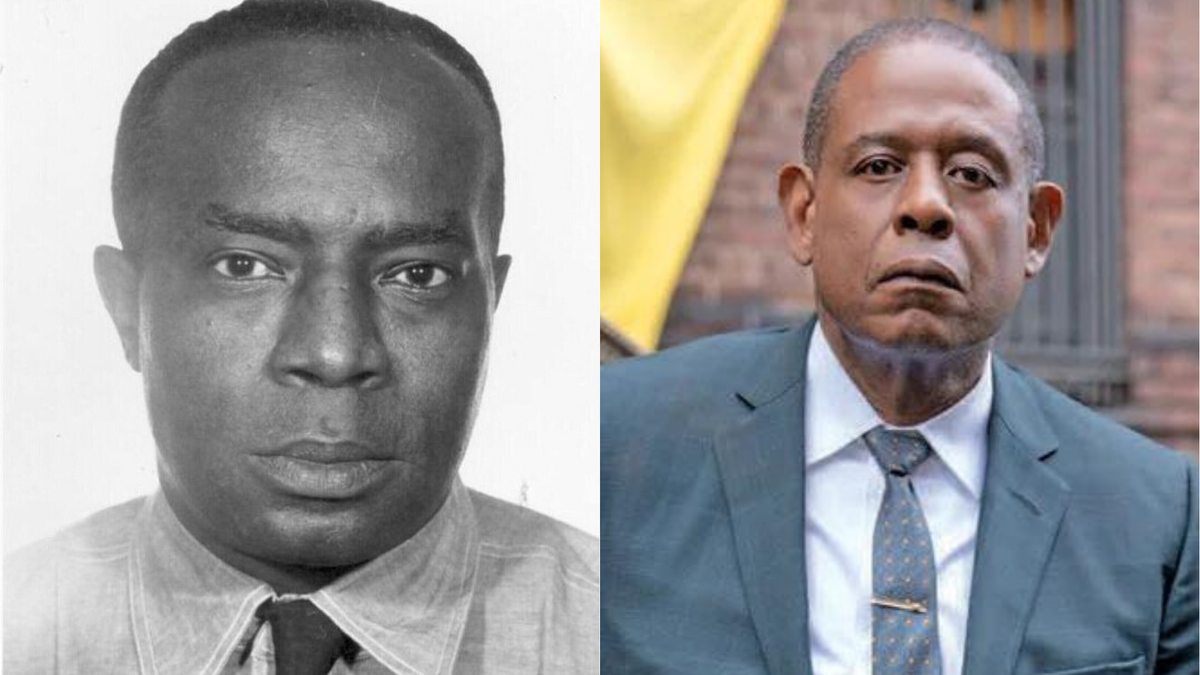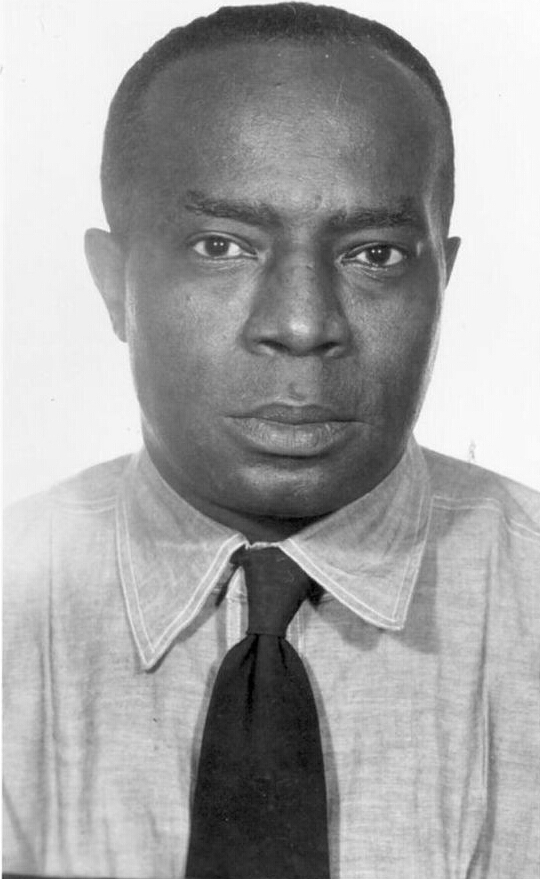Bumpy Johnson: Harlem's Uncrowned King And His Enduring Legacy
Ellsworth Raymond "Bumpy" Johnson, a name synonymous with Harlem's tumultuous 20th-century underworld, remains one of the most enigmatic and compelling figures in American history. Born in Charleston, South Carolina, on October 31, 1905, to Margaret Moultrie and William Johnson, his journey from the Deep South to becoming Harlem's most powerful crime boss is a tale of resilience, strategic genius, and unexpected community ties.
More than just a notorious gangster, Bumpy Johnson transcended the typical image of a crime lord. He was a man of contradictions: a ruthless enforcer who was also a keen businessman, a fashion icon, a jazz enthusiast, and surprisingly, a philanthropist deeply connected to his community. His story, often romanticized in Hollywood, offers a unique window into the social and racial complexities of an era where a Black man defied segregation to rise to unparalleled power in New York City.
Biography: The Formative Years of Ellsworth "Bumpy" Johnson
From Charleston to Harlem: A Childhood Shaped by Adversity
Ellsworth Raymond Johnson's early life was marked by the harsh realities of the Jim Crow South. Born in Charleston, South Carolina, in 1905, his family faced significant challenges. A pivotal moment occurred when he was just 10 years old: his older brother, Willie, was accused of killing a white man. Fearing a potential lynch mob, his parents, Margaret Moultrie and William Johnson, made an immense sacrifice. They mortgaged their tiny home to raise money, sending Willie north to live with relatives. This incident likely instilled in young Ellsworth a deep understanding of racial injustice and the lengths one might go to protect family, shaping his future outlook.
- Sotwe Olgun
- Rocketreyna Leaked
- Jasmine Crockett Husband
- Jayshree Gaikwad Web Series List
- Sani Peyarchi 2025 To 2027
During his formative years, Johnson's family eventually moved north to Harlem, New York. This relocation from the segregated South to the bustling, culturally vibrant, yet economically challenging streets of Harlem, was a common migration pattern for many African Americans seeking better opportunities and an escape from racial oppression. It was in Harlem that Ellsworth Johnson would truly come into his own, learning the ropes of street life and laying the groundwork for his eventual rise to power.
The Origins of a Nickname and a Legend
The nickname "Bumpy" is famously associated with Ellsworth Raymond Johnson, though its precise derivation is debated. Some theories link it to his physical appearance, perhaps a slightly uneven gait or a noticeable scar, while others suggest it referred to his unpredictable and often violent temper. Regardless of its exact origin, the moniker became synonymous with his formidable reputation. As Bumpy Johnson, he would become one of Harlem's most notorious crime bosses of the 20th century, a figure whose name commanded both fear and respect.
Personal Data and Biodata of Bumpy Johnson
To better understand the man behind the legend, here is a summary of key personal data for Ellsworth Raymond "Bumpy" Johnson:
- Lena Miculek Husband
- Is Selena Samuela Pregnant
- Jmantheangel News
- Remote Iot Vpc Tutorial
- Wwxx Com Reviews 2024
| Attribute | Detail |
|---|---|
| Full Name | Ellsworth Raymond Johnson |
| Nickname | Bumpy |
| Born | October 31, 1905, Charleston, South Carolina, U.S. |
| Died | July 7, 1968 (aged 62), Harlem, New York City, U.S. |
| Parents | Margaret Moultrie and William Johnson |
| Spouse | Mayme Hatcher Johnson |
| Children | Elease Johnson (adopted daughter) |
| Known For | American crime boss in Harlem, New York City |
| Years Active | Primarily 1930s-1960s |
| Affiliations | Various Harlem gangs, Genovese crime family (at times), Malcolm X (alliance) |
The Rise to Power: Bumpy Johnson's Reign in Harlem
Navigating the Roaring Twenties: Gambling and High Society
In the roaring 1920s, Harlem was a vibrant hub of culture and illicit activity. Lenox Hill society, a playground for the rich and famous, saw Bumpy Johnson frequent its exclusive clubs, rubbing elbows with high society. This early exposure to both the street-level grind and the upper echelons of society likely honed his unique blend of street smarts and sophisticated charm. He became known for his astute business acumen, particularly in illegal gambling, a lucrative enterprise during Prohibition and beyond. His gambling skills were legendary, allowing him to amass wealth and influence.
As a bodyguard from the deep South, Bumpy Johnson steadily climbed the ranks, transforming into Harlem's kingpin of illegal gambling and drug trafficking. His sharp wit and strategic mind set him apart. He wasn't just a brute; he was a chess master, always several moves ahead of his rivals and the authorities. This intellectual prowess, combined with a willingness to employ violent tactics when necessary, solidified his position.
The Master Strategist: Brokering Deals and Battling the Mafia
Bumpy Johnson's reign as a crime boss in the 1930s and 1940s made him a feared and respected figure. He was renowned for his ability to broker deals between rival gangs, often preventing bloodshed and ensuring a degree of stability in Harlem's underworld. This diplomatic skill, rare among gangsters, highlighted his understanding of power dynamics and his desire for order, albeit on his own terms.
However, his most significant challenge came from the Italian Mafia. It was rare for Black people to rise to such power during the era of segregation, but against all odds, Bumpy Johnson somehow managed to do so. Between the 1950s and the 1960s, he was arguably the most powerful man in the Harlem neighborhood of New York City. When he returned from ten years in prison in the early 1960s, as depicted in the fictionalized story "Godfather of Harlem," he found the neighborhood he once ruled in shambles, with the streets controlled by the Italian mob. Bumpy had to take on the Genovese crime family to regain control, a battle that cemented his legend as a man who dared to challenge the established racial hierarchy of organized crime.
Beyond the Boss: Bumpy Johnson's Unexpected Sides
Despite his criminal activities, Bumpy Johnson was a man of many facets that defy the typical gangster stereotype. He was lauded as the "Godfather of Harlem," often described as a "golden age cat with nine lives." His complex personality included a deep passion for jazz, a reflection of Harlem's vibrant cultural scene during his era. He was known to frequent jazz clubs, appreciating the music and perhaps finding a different kind of rhythm amidst the chaos of his life. This passion for jazz, coupled with his impeccable style, contributed to his image as a fashion icon. He dressed sharply, always presenting himself with an air of sophistication that belied his profession.
His intelligence extended beyond street smarts; he was known for his sharp wit and strategic mind, making him a formidable conversationalist as well as a ruthless operator. This combination of traits allowed him to navigate both the criminal underworld and, surprisingly, to gain a certain level of acceptance, or at least tolerance, from segments of the wider community and even law enforcement.
A Community's Complex Relationship: The Philanthropist and the Gangster
Perhaps one of the most surprising aspects of Bumpy Johnson's legacy is the affection he garnered from his community. While he was undoubtedly a criminal, involved in illegal gambling and drug trafficking, he was also seen by many as a protector and benefactor of Harlem. He engaged in philanthropy, often providing aid to the poor and needy within the neighborhood. This dual nature – the feared crime boss and the benevolent community figure – created a complex relationship with the residents of Harlem.
He was known to distribute turkeys during Thanksgiving, pay for funerals, and offer financial assistance to families struggling to make ends meet. In an era where systemic racism and economic hardship plagued Black communities, figures like Bumpy Johnson, despite their illicit means, sometimes filled the void left by inadequate government support. This created a paradoxical loyalty, where his criminal empire was tolerated, and even appreciated, for the stability and direct aid it sometimes provided. His alliance with Muslim minister Malcolm X, as depicted in "Godfather of Harlem," further highlights his engagement with significant historical figures and the broader socio-political landscape of his time, showcasing his influence beyond mere criminal enterprise.
The End of an Era: What Happened to Bumpy Johnson?
After decades of ruling the streets, Bumpy Johnson's power eventually waned, and he faded into obscurity for a period. Though he was arrested dozens of times throughout his career, he always seemed to find a way back, earning his "nine lives" reputation. However, even the most legendary figures eventually face their end. The most shocking thing about Harlem gangster Ellsworth "Bumpy" Johnson is that he died, not in a hail of bullets or a dramatic shootout, but "like a schnook."
Ellsworth Raymond "Bumpy" Johnson passed away peacefully on July 7, 1968, at the age of 62, while having a meal at Wells Restaurant in Harlem. His death, attributed to heart failure, was a quiet end for a man whose life had been anything but. It marked the definitive close of an era, as Harlem continued to evolve and the landscape of organized crime shifted.
Bumpy Johnson's Enduring Legacy in Pop Culture
From "The Cotton Club" to "Godfather of Harlem": Portrayals on Screen
Bumpy Johnson's captivating life story has made him a perennial subject of fascination for Hollywood. He has been the subject or character in a number of films, cementing his place in popular culture. One of his earliest notable appearances was in Francis Ford Coppola's 1984 film The Cotton Club, where he was portrayed by Laurence Fishburne. This film offered a glimpse into the jazz age and the criminal underworld that often intertwined with it.
Later, Fishburne would reprise the role in the 1997 film Hoodlum, which focused more directly on Johnson's rise and rivalry with Dutch Schultz. Most recently, and perhaps most prominently, Johnson was a central figure in Ridley Scott's 2007 film American Gangster, where he was portrayed by Clarence Williams III, and the narrative largely revolved around his protégé, Frank Lucas. The enduring popularity of these portrayals highlights the compelling nature of Bumpy Johnson's life and the historical period he inhabited.
The Real-Life Figures Behind "Godfather of Harlem"
The recent Epix (now MGM+) drama series Godfather of Harlem has brought Bumpy Johnson back into the spotlight for a new generation. Inspired by the life of Harlem mob boss Bumpy Johnson, the show features major historical figures like Malcolm X and Muhammad Ali, weaving a fictionalized narrative around real events. For four thrilling seasons, Forest Whitaker has portrayed the notorious New York gangster Bumpy Johnson, earning critical acclaim for his nuanced performance.
While the series takes creative liberties for dramatic effect, it has reignited interest in the real Bumpy Johnson and the complex historical context of 1960s Harlem. The show's portrayal of Bumpy's struggle to regain control from the Italian mob and his unlikely alliance with Malcolm X has sparked conversations about race, power, and justice in that turbulent era. As fans patiently wait for season 4 of Godfather of Harlem to be announced, many are delving deeper into the fascinating facts about the real Bumpy Johnson, distinguishing the historical figure from his on-screen persona.
Elease Johnson: A Daughter's Life in the Shadow of a Legend
While Bumpy Johnson's public life was dominated by his criminal exploits, his personal life, though less documented, also had its complexities. His adopted daughter, Elease Johnson (often referred to incorrectly as Elise Johnson), gained significant recognition primarily because of her connection to her father. Despite passing in 2006, conversations about her often emerge, highlighting the complexities of a life shaped by her father's notorious reputation. Growing up as the child of such a powerful and controversial figure would undoubtedly have presented unique challenges and experiences, offering a glimpse into the human cost and familial impact of a life lived on the fringes of society.
Why Bumpy Johnson Still Captivates Us Today
Ellsworth Raymond "Bumpy" Johnson's story continues to resonate because it is more than just a tale of crime; it is a narrative of ambition, survival, and defiance against societal odds. In an era of profound racial segregation, his ability to rise to such prominence as a Black man in a world dominated by white power structures was truly remarkable. He was a master of strategy, a complex individual who was both feared and, in a strange way, loved by his community. His life serves as a compelling study of power dynamics, racial injustice, and the blurred lines between hero and villain.
From his early struggles in Charleston to his reign as the undisputed kingpin of Harlem, Bumpy Johnson navigated a treacherous path. His legacy, perpetuated through books, films, and television series, ensures that his name remains etched in the annals of American history, a testament to a man who, against all odds, forged his own empire and left an indelible mark on the cultural landscape of the 20th century.
What are your thoughts on Bumpy Johnson's impact on Harlem? Share your perspectives in the comments below! If you found this article insightful, consider sharing it with others who might be interested in the complex history of American crime and culture. For more deep dives into historical figures and their legacies, explore other articles on our site.

Bumpy Johnson: The Godfather of Harlem

15 Gangsta Things About Bumpy Johnson, The Real Godfather of Harlem

Bumpy Johnson - Wikipedia